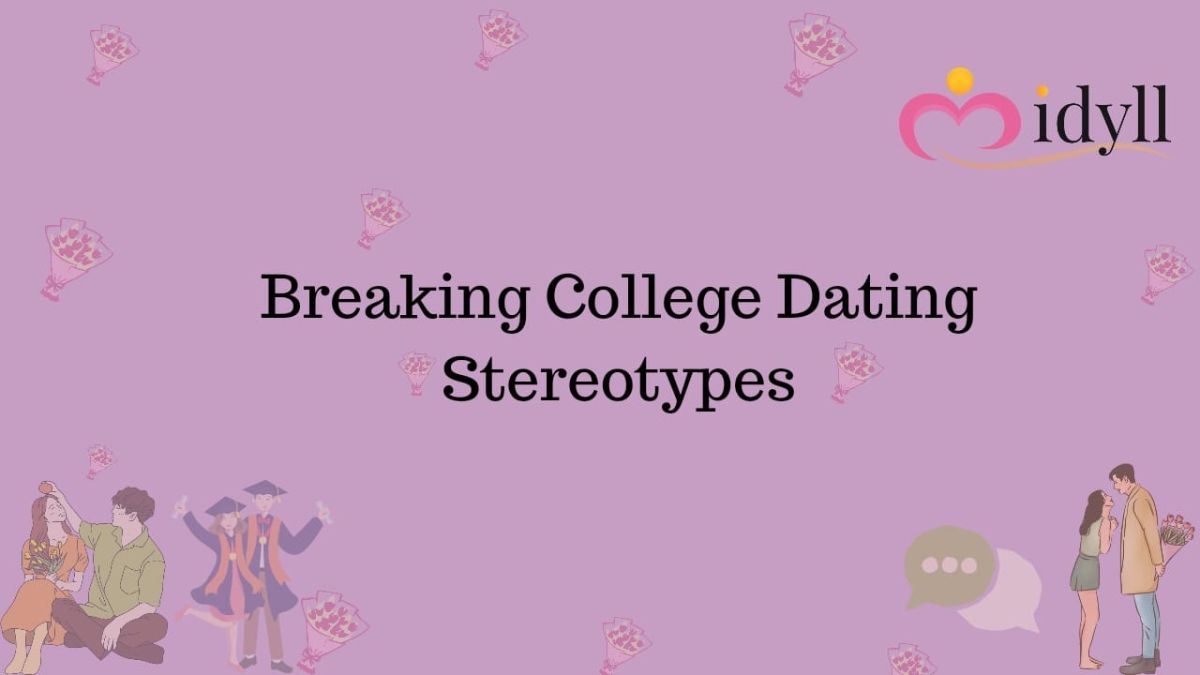Breaking College Dating Stereotypes

At present time there are many stereotypes related to college dating that need to be broken. Breaking college dating stereotypes is crucial for fostering genuine connections and creating a more inclusive and fulfilling campus environment. Traditional dating norms often perpetuate gender roles, limiting individuals' authentic expressions and experiences. To overcome these stereotypes, it's essential to encourage open communication, redefine expectations, and embrace diversity in dating approaches. By dismantling these outdated conventions, college students can cultivate healthier relationships based on mutual respect, consent, and shared values.
One key aspect of challenging dating stereotypes in college is promoting equality and dismantling traditional gender roles. Historically, societal expectations have assigned specific roles to men and women in relationships, reinforcing power imbalances and limiting individual agency. By challenging these norms, college students can redefine their roles in dating, fostering more egalitarian and empowering connections. This shift involves encouraging both men and women to take initiative, communicate openly, and participate equally in decision-making processes.
Furthermore, breaking college dating stereotypes involves dismantling the idea of a "one-size-fits-all" approach to relationships. Recognizing and celebrating diversity in dating preferences, styles, and orientations creates a more inclusive atmosphere. This inclusivity extends beyond gender, encompassing various cultural backgrounds, beliefs, and relationship dynamics. Embracing this diversity helps dispel stereotypes that dictate how relationships should unfold, allowing individuals to authentically express themselves and connect with others based on shared interests and values.

Open communication is a fundamental component of challenging dating stereotypes in college. Encouraging honest and transparent conversations about expectations, boundaries, and desires helps foster a culture of consent and mutual understanding. This proactive approach empowers individuals to voice their needs and preferences, promoting a more respectful and considerate dating environment. By breaking down communication barriers, students can navigate the complexities of relationships with empathy and intentionality, moving away from the stereotypes that often stem from assumptions and misunderstandings.
Additionally, redefining the concept of success in college dating is vital for challenging stereotypes. Traditional markers of success, such as the frequency of dates or the exclusivity of relationships, may not align with everyone's values or aspirations. Encouraging a more personalised and subjective definition of success allows individuals to prioritise their well-being and emotional fulfilment over conforming to societal expectations. This shift challenges the notion that there is a universally "right" way to navigate college dating, empowering students to pursue relationships that align with their individual goals and desires.
Creating supportive communities and resources on college campuses is essential for challenging dating stereotypes. Establishing spaces where students can openly discuss their experiences, seek advice, and share diverse perspectives fosters a sense of belonging. These communities can challenge harmful stereotypes by promoting empathy, understanding, and solidarity among students. Moreover, providing educational resources on healthy relationships, consent, and communication equips students with the tools to navigate dating in a respectful and informed manner, contributing to the overall dismantling of damaging stereotypes. For creating communities and healthy relationships between any of the two parties, communication is important, especially for a couple involved in a love relationship.
👀Do you know why is communication important? If not, then have a look at this blog https://getidyll.in/blog/why-is-communication-important-for-healthy-relationships/. It will solve so many communication problems that will definitely get you to a healthy relationship.
Breaking college dating stereotypes is a multifaceted process that involves challenging traditional gender roles, embracing diversity, fostering open communication, redefining success, and creating supportive communities. By actively engaging in these efforts, college students can contribute to a more inclusive and empowering dating culture on campus. Ultimately, dismantling stereotypes in college dating is not only about challenging external expectations but also about fostering a genuine and respectful connection between individuals based on their unique identities and experiences.
Table Of Content:
Now some of the main stereotypes are given below:
1. Challenging Traditional Gender Roles:
Breaking college dating stereotypes begins with dismantling traditional gender roles. Encouraging both men and women to take on roles traditionally associated with the other gender can empower individuals to express themselves authentically. Initiating conversations, planning dates, or expressing emotions should not be confined to specific genders. By challenging these norms, students can create relationships based on mutual respect and shared responsibilities, fostering equality.

2. Embracing Diversity:
College campuses are microcosms of diversity, and this should be reflected in dating experiences. Encouraging students to explore relationships with people from various cultural backgrounds, belief systems, and orientations promotes inclusivity. Celebrating diversity in all its forms helps break away from stereotypes that dictate who should date whom. It allows individuals to connect based on shared interests and values rather than conforming to predefined notions of compatibility.
3. Open Communication:
Transparent communication is the cornerstone of healthy relationships. Encouraging students to openly express their expectations, boundaries, and desires facilitates a culture of consent and mutual understanding. It's about fostering a safe space where individuals feel confident discussing their needs and actively listening to their partners. This proactive approach helps dispel assumptions and misunderstandings that often lead to stereotyping in relationships. Effective communication is a cornerstone of any successful relationship. In the context of college dating, breaking stereotypes requires open and honest conversations about expectations, desires, and boundaries. Encouraging open dialogue allows individuals to express themselves without fear of judgment and helps establish a foundation of trust and understanding.
4. Redefining Success:
The traditional markers of success in dating, such as the frequency of dates or the exclusivity of relationships, may not resonate with everyone. Redefining success means acknowledging and valuing diverse relationship goals. Some students may prioritise casual connections, while others seek long-term commitments. Encouraging individuals to define success on their terms helps dismantle the notion that there's a universally "correct" way to navigate the college dating scene.

5. Supportive Communities and Resources:
Establishing supportive communities on college campuses is pivotal. These communities provide spaces where students can share their experiences, seek advice, and challenge stereotypes collectively. Initiatives such as discussion groups, workshops on healthy relationships, and awareness campaigns contribute to building a culture that rejects harmful stereotypes. Educational resources equip students with the knowledge and skills to navigate relationships responsibly, fostering an environment where stereotypes are actively dismantled.
6. Redefining Dating Scripts:
Dating often comes with predefined scripts that dictate how a romantic interaction should unfold. Breaking free from these scripts involves challenging the traditional timeline of dating milestones and allowing relationships to evolve organically. This might mean rejecting outdated notions of who should make the first move or when certain relationship milestones should occur.
7. Fostering Genuine Connections:
Instead of focusing on superficial aspects of dating, such as appearance or status, students can break stereotypes by prioritizing genuine connections. Building relationships based on shared values, interests, and mutual respect goes beyond surface-level expectations and creates a foundation for long-lasting connections.
8. Empowering Consent and Boundaries:
Breaking stereotypes in college dating involves prioritising consent and establishing clear boundaries. Encouraging individuals to communicate their comfort levels and ensuring that both parties actively consent to each step of the relationship challenges the idea that certain actions are expected or assumed in a dating context.
CONCLUSION
In conclusion, breaking college dating stereotypes is a nuanced and multifaceted endeavour. It requires individuals to embrace their uniqueness, communicate openly, challenge gender norms, redefine dating scripts, foster genuine connections, respect diverse relationships, and prioritise consent and boundaries. By actively working towards a more inclusive and authentic dating culture, college students can create relationships that reflect their true selves and contribute to a richer and more fulfilling campus experience.
💕Happy Dating!
Finding a compatible match?
✌️Download Idyll- The Perfect College Dating App!

